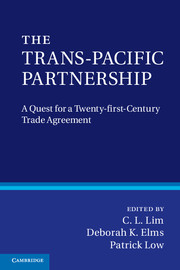Book contents
- Frontmatter
- Contents
- List of Figures and Tables
- Contributors
- Preface
- Acknowledgements
- Disclaimer
- Glossary
- Part I Introduction
- Part II The past: origins of the TPP Agreement
- Part III The present: twenty-first century elements and obstacles
- Part IV The future: high-quality meets regional and global realities
- 15 Achieving a Free Trade Area of the Asia-Pacific
- 16 APEC and the TPP
- 17 Coping with multiple uncertainties
- 18 The TPP
- 19 The TPP in a multilateral world
- Part V The TPP negotiations: the quest for quality
- Index
- References
17 - Coping with multiple uncertainties
Latin America in the TPP negotiations
Published online by Cambridge University Press: 05 November 2012
- Frontmatter
- Contents
- List of Figures and Tables
- Contributors
- Preface
- Acknowledgements
- Disclaimer
- Glossary
- Part I Introduction
- Part II The past: origins of the TPP Agreement
- Part III The present: twenty-first century elements and obstacles
- Part IV The future: high-quality meets regional and global realities
- 15 Achieving a Free Trade Area of the Asia-Pacific
- 16 APEC and the TPP
- 17 Coping with multiple uncertainties
- 18 The TPP
- 19 The TPP in a multilateral world
- Part V The TPP negotiations: the quest for quality
- Index
- References
Summary
Introduction
The ongoing negotiations for the enlargement of the Trans-Pacific Partnership Agreement (TPP) were launched in March 2010. At the time of writing (early January 2012) nine countries from both rims of the Pacific Basin participate in this process. Among them are two Latin American countries: Chile, an original signatory of the P4 in 2005, and Peru. Two other countries from the region, Colombia and Mexico, have at different times expressed interest in joining the negotiations.
The TPP is currently the United States’ main initiative in the area of trade negotiations. According to US authorities, the expanded and updated TPP would be a “next-generation, twenty-first century” agreement which could, through its gradual expansion, become a platform for the construction of a trans-Pacific free trade space. It would thus provide a counterbalance to the centripetal tendencies observed today in East and Southeast Asia. These are reflected, among other ways, in initiatives centred on the Association of Southeast Asian Nations (ASEAN), such as the so-called ASEAN+3 and ASEAN+6 projects, and in the renewed support provided by the leaders of China, Japan and the Republic of Korea (henceforth Korea) to the launch of negotiations for a trilateral preferential trade agreement (PTA). In short, the TPP project aims both at setting the rules for trade and investment in the Asia-Pacific over the coming decades and at consolidating the United States’ presence in the world’s most economically dynamic region. It is therefore a strategic project in both economic and political terms.
Information
- Type
- Chapter
- Information
- The Trans-Pacific PartnershipA Quest for a Twenty-first Century Trade Agreement, pp. 260 - 278Publisher: Cambridge University PressPrint publication year: 2012
References
Accessibility standard: Unknown
Why this information is here
This section outlines the accessibility features of this content - including support for screen readers, full keyboard navigation and high-contrast display options. This may not be relevant for you.Accessibility Information
- 3
- Cited by
